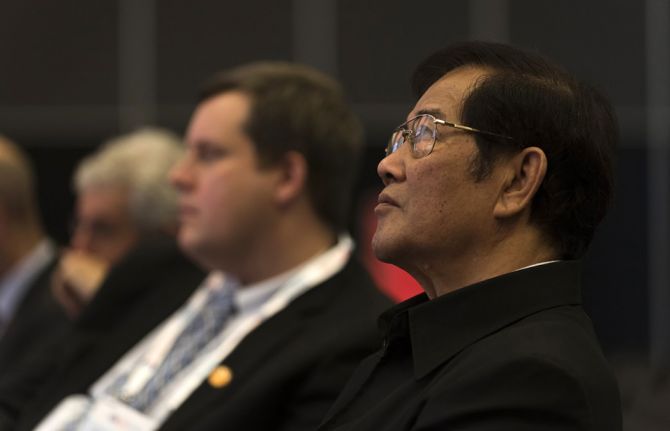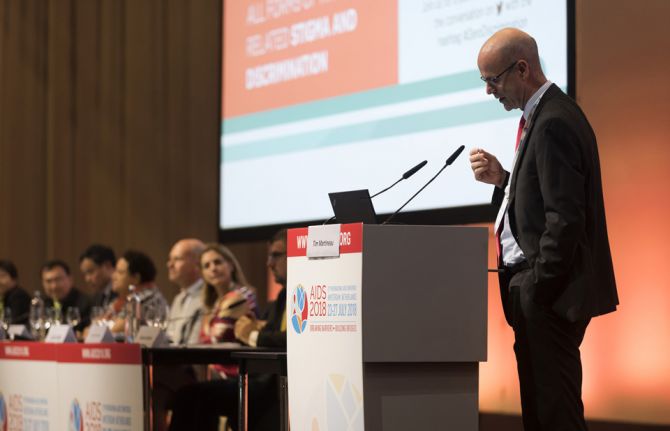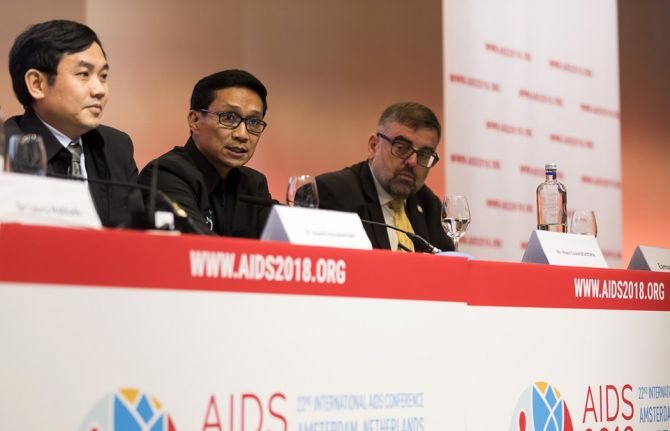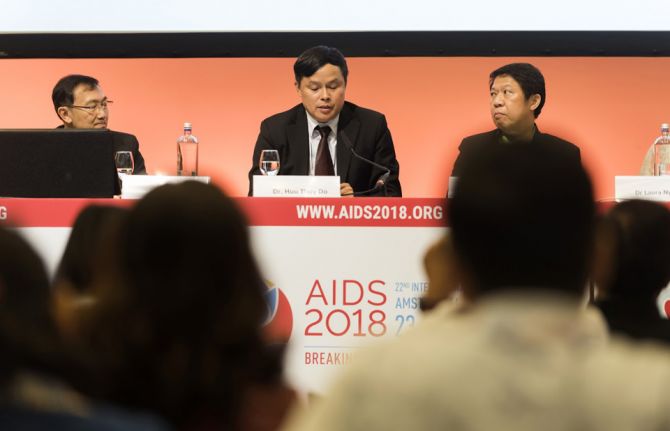





Feature Story
Catalysing zero discrimination in health-care settings in Thailand and Viet Nam
23 July 2018
23 July 2018 23 July 2018Stigma and discrimination in health-care settings is a major obstacle to ending AIDS. Widespread across the world, stigma and discrimination seriously reduces the quality of life of people who experience it and hinders their access to health and HIV services.
How to catalyse country initiatives and reduce stigma and discrimination in health-care facilities was the focus of a session at the International AIDS Conference on 23 July in Amsterdam, Netherlands. The session, Catalyzing Thailand and Regional Initiatives on Zero Discrimination in Healthcare Settings and Building Bridges Towards a Global Compact to Eliminate all Forms of HIV-Related Stigma and Discrimination, brought together representatives of the Governments of Thailand, Viet Nam and the Netherlands and representatives of regional civil society networks, the United States Centers for Disease Control and Prevention and UNAIDS.
Thailand is acknowledged as a pioneer in reducing stigma and discrimination in health-care settings in Asia through its innovative system-wide response. The event heard that the Thai stigma and discrimination reduction package is based on global measuring tools and contains a permanent monitoring system, evidence-informed actions at health facilities and community engagement at all levels.
Viet Nam piloted a stigma and discrimination reduction programme in Ho Chi Minh. At the session, Huu Thuy Do, Head of the Information, Education and Communication Department of the Viet Nam Administration for AIDS Control, explained how Viet Nam learned from cooperation with Thailand and how the Thai model was translated to the city level in Viet Nam.
Based on the experiences of Thailand and Viet Nam, speakers encouraged countries to foster cross-border links on stigma and discrimination reduction efforts in health-care settings in order to achieve more effective and efficient joint global action.
The participants also learned from the Dutch approach, which directs attention to the inequality of access to HIV prevention and treatment services while promoting an enabling legal environment to prevent stigma and discrimination.
The participants heard that the greater engagement of communities, people living with HIV and key populations in the development and monitoring of programmes against stigma and discrimination is a core element for successful stigma and discrimination reduction programmes. Their participation not only increases access by hard-to-reach communities, but also helps ensure that a rights-based approach is used.
The event concluded with the presentation of the Global Framework for Action, an initiative led by civil society that aims to catalyse and accelerate the implementation of commitments made to end HIV-related stigma and discrimination in different settings.
Quotes
“Thailand is a pioneer in the Asia region in developing a comprehensive programme to create health-care settings free from stigma and discrimination, leading to better health outcomes that go beyond HIV. In Thailand, we developed an intervention package that adapted global tools to our local context to stop stigma and discrimination. Stigma and discrimination is now systematically measured through surveys as part of that intervention package. The collected data are subsequently used to increase awareness, inform interventions and serve as a catalyst for system-wide actions.”
“What we should do is talk with religious leaders and talk with traditional leaders to make them see that discrimination and stigmatization is also a threat to society.”
“Discrimination at work links with health care. We find that people living with HIV all over the world face huge fears about disclosure, losing their jobs. Young people living with HIV have extremly high levels of unemployment.”
“Human rights, including stigma and discrimination and gender related vulnerabilities, are among the reasons for the serious HIV prevention gap and the insufficient progress that has been made in reducing new HIV infections in many regions of the world.”
"While HIV related stigma and discrimination are far from over, our experiences show that stigma and discrimination are both measurable and actionable. Reduction tools are available and when combined with collective leadership from key stakeholders and partners, we can end HIV related stigma through evidence based monitoring and effective interventions. Vision without action is just a dream but with action can make a difference. The world should unite to eradicate stigma and discrimination in all its forms."
"In the Thai model, the involvement of CSOs, PLHIV and KP’s goes beyond just an invitation to speak at a S&D reduction training. Communities are significantly involved in the entire process, from the programme consultation, planning over the implementation to the monitoring of progress."



